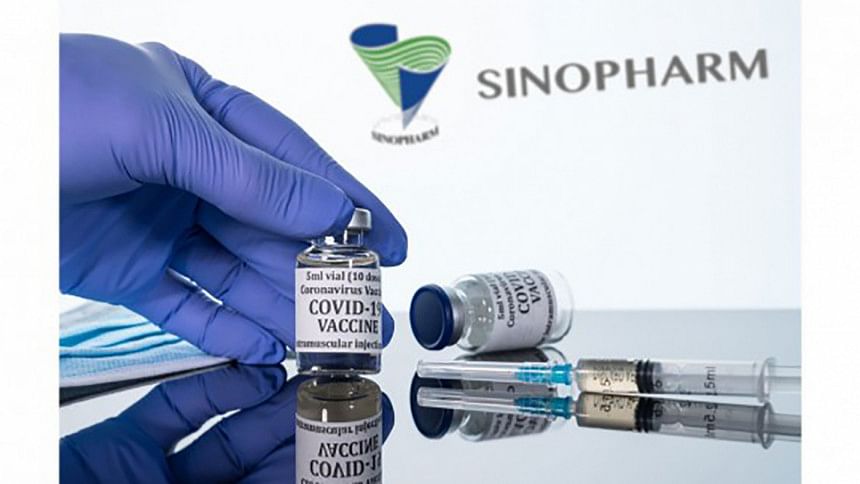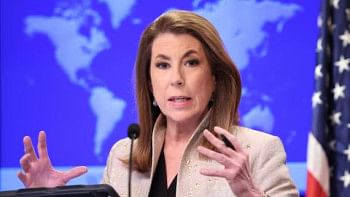Purchase of Sinopharm Vaccine: Price disclosure sparks confusion

Confusion has arisen over the price of Sinopharm shots as the government closes in on the vaccine purchase from China in a desperate effort to keep the inoculation campaign rolling.
In a meeting, the Cabinet Committee on Government Purchase yesterday approved a proposal for buying 1.5 crore doses of Sinopharm's Covid-19 vaccine, paving the way for the final agreement.
Immediately after the meeting, chaired by Finance Minister AHM Mustafa Kamal, a Cabinet Division official told reporters at a briefing that they were purchasing the vaccine at $10 per dose.
However, as the news spread online through different media outlets, including The Daily Star, ministry officials contested the disclosure saying that the price had not been approved yet.
A finance ministry official sent a text to the messenger group of reporters covering the ministry, requesting the media not to mention the price for the "greater interest of the country".
Contacted, Health Minister Zahid Maleque declined to disclose the price of the vaccine.
"As the purchase committee has approved the proposal, we hope that the procurement agreement between the two countries will be signed very soon," he said.
A Cabinet Division official told The Daily Star that Bangladesh will get 50 lakh doses of Sinopharm vaccines each month (June, July and August).
A total of 1.5 crore vaccine shots will be purchased which will cost Tk 1,267 crore, said the source.
Zahid said the government will bring the vaccine from China at its own cost.
The minister said once the procurement deal is signed and the first shipment arrives by June, the inoculation campaign will gather pace.
"The first dose vaccination programme, which is now suspended, will resume again," the minister added.
The government suspended administering the first dose of vaccine on April 26, soon after India temporarily banned export of vaccine produced in the Serum Institute of India.
Bangladesh purchased 3 crore doses of AstraZeneca vaccine from Serum and was supposed to receive 50 lakh jabs per month for six months from January to June.
The government purchased AstraZeneca vaccine at $5 per dose through a tripartite agreement that included $1.5 per shot as service charge for Serum's local agent Beximco Pharmaceuticals Limited.
According to the agreement, Beximco will carry the vaccine from India and transport it to the government designated district centres at its own expense.
Serum delivered the first 50 lakh doses in January, but shipped only 20 lakh in February. No other shipment has been made since then as the Indian government banned export of vaccine to meet its domestic demand.
Bangladesh is also supposed to get 6.8 crore doses of vaccines from Covax, a global vaccine alliance, this year. But the government has got a response from the Covax that it will give 1.06 lakh Pfizer vaccine on May 30.
Covax had earlier announced that Bangladesh would get around 1.27 crore doses in the first quarter (May-June).
Faced with uncertainty over getting vaccines from Serum, the government started exploring alternative sources and communicated with Russia and China in particular to secure their vaccines.
Bangladesh gave emergency use authorisation to both Russia's Sputnik V and China's Sinopharm vaccine last month.
The Sinopharm vaccine is produced by Beijing Bio-Institute of Biological Products Co Ltd, a subsidiary of China National Biotec Group (CNBG).
The World Health Organization has listed the Sinopharm vaccine for emergency use on May 7.
The Chinese government gave 5 lakh doses of Sinopharm vaccine to Bangladesh on May 12 as gift and has also pledged to donate another six lakh doses of vaccine for second dose administration. It is now being administered to medical students and healthcare professionals.
The government started the mass inoculation against Covid-19 on February 7 with a target of vaccinating the country's 160 million people in phases.
However, only 2 percent of the population have so far got the double-dose of AstraZeneca vaccine while less than 4 percent got the first shot, according DGHS data updated till Thursday.
The WHO last month said the wealthy countries have received the vast majority of the world's supply of Covid-19 vaccine doses, while poor countries have obtained less than 1 percent.
Of the 700 million vaccine doses that have been distributed across the globe, "over 87 percent have gone to high-income or upper- and middle-income countries, while low-income countries have received just 0.2 percent," said WHO Director-General Tedros Adhanom Ghebreyesus.
PFIZER VACCINE GETS APPROVAL
Meanwhile, the Directorate General of Drug Administration (DGDA) has issued emergency use authorisation to the Pfizer mRNA Covid-19 vaccine in the country yesterday, said a press release signed by Maj Gen Md Mahbubur Rahman, director general of DGDA.
Produced by Pfizer Manufacturing Belgium NV, this is the fourth Covid vaccine approved for emergency use in Bangladesh after AstraZeneca's Covishield, Russia's Sputnik V and Sinopharm's BBIBP-CorV.
Health officials said they were planning to use the Pfizer vaccine in Dhaka city considering the storage capacity.

 For all latest news, follow The Daily Star's Google News channel.
For all latest news, follow The Daily Star's Google News channel. 



Comments